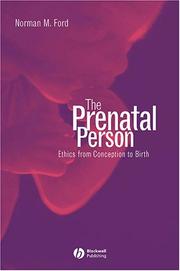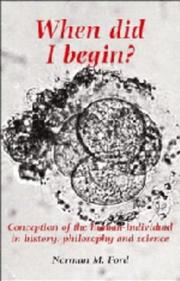| Listing 1 - 4 of 4 |
Sort by
|

ISBN: 0631234926 0631234918 9780631234920 Year: 2002 Publisher: Oxford Blackwell
Abstract | Keywords | Export | Availability | Bookmark
 Loading...
Loading...Choose an application
- Reference Manager
- EndNote
- RefWorks (Direct export to RefWorks)
A host of ethical questions has arisen recently in response to the development of new reproductive technologies. This text helps students of theology, philosophy and health studies, as well as lay readers to find answers to these questions. A host of ethical questions has arisen recently in response to the development of new reproductive technologies. This text helps students of theology, philosophy, and health studies, as well as lay readers, to find answers to these questions. In order to facilitate an informed discussion of the many delicate ethical issues, the book first provides readers with relevant medical and scientific information. It explains in a clear and simple way, for example, what is involved in human embryo and embryonic cell stem research, infertility and its treatments, and prenatal screening and diagnosis. It also explains how the metaphysical framework, in which both Christian and secular philosophers think, relates to the scientific facts and affects the ways in which they solve ethical problems. Throughout, the author takes a balanced approach, acknowledging his loyalty to Catholicism, yet freely exploring new options indicated by advancing biological science.
Human reproductive technology --- Moral and ethical aspects. --- Religious aspects --- Catholic Church. --- 241.63 --- -Human reproductive technology --- -bio-ethiek (medische, biomedische ethiek, bio-ethische aspecten) --- Christelijke ethiek --- persoon --- gezondheid (gezondheidsconcept) --- bijbel --- gezondheidszorg --- menselijk embryo --- embryo-onderzoek (experiment op embryo's, onderzoek op embryo's in vitro) --- zwangerschap --- reproductieve technologie (voortplantingstechnologie, medisch begeleide voortplanting, MBV, artificiële voortplanting, kunstmatige voortplanting) --- prenatale diagnostiek (prenatale test) --- foetus --- pasgeborene (zuigeling, neonatus, pasgeboren kind) --- Assisted human reproduction --- Assisted conception --- Conception --- Human assisted reproduction --- Human reproduction --- Medical technology --- Reproductive technology --- Theologische ethiek: eerbied voor het leven en de waardigheid van de menselijke persoon --- Moral and ethical aspects --- -Catholic Church --- bioéthique (éthique médicale, biomédicale, aspects bioéthiques) --- éthique chrétienne --- personne --- santé (concept de santé) --- bible --- soins de santé --- embryon humain --- recherche sur l'embryon (expérimentation sur l'embryon, recherche sur les embryons in vitro) --- grossesse --- technique de reproduction (technique de procréation, procréation médicalement assistée, PMA, procréation artificielle) --- diagnostic prénatal (test prénatal, DPN) --- nouveau-né --- Technological innovations --- 241.63 Theologische ethiek: eerbied voor het leven en de waardigheid van de menselijke persoon --- bio-ethiek (medische, biomedische ethiek, bio-ethische aspecten) --- Religious aspects&delete& --- Catholic Church --- Assisted human reproductive technology --- Human assisted reproductive technology --- Human reproductive technology - Moral and ethical aspects. --- Human reproductive technology - Religious aspects - Catholic Church.

ISBN: 052134428X 0521424283 9780521344289 9780521424288 9780511623554 Year: 1988 Publisher: Cambridge : Cambridge University Press,
Abstract | Keywords | Export | Availability | Bookmark
 Loading...
Loading...Choose an application
- Reference Manager
- EndNote
- RefWorks (Direct export to RefWorks)
Philosophical anthropology --- Embryology, Human --- Life --- Origin --- 130.14 --- #GROL:SEMI-241.633 --- 612.013 --- Wijsgerige antropologie: lichaam --- Theologische ethiek: bio-ethiek (bioethiek) genetische experimenten transplantatie eugenetica --- 241.63*5 Theologische ethiek: bio-ethiek (bioethiek) genetische experimenten transplantatie eugenetica --- 130.14 Wijsgerige antropologie: lichaam --- 128 --- 611.013 --- $?$92/02 --- #GBIB:CBMER --- 241.63*5 --- Anthropology, Philosophical --- Man (Philosophy) --- Civilization --- Ontology --- Humanism --- Persons --- Philosophy of mind --- Human embryology --- Embryology --- Human biology --- Human reproduction --- 241.63*5 Theologische ethiek: bio-ethiek (bioethiek); genetische experimenten; transplantatie; eugenetica --- Theologische ethiek: bio-ethiek (bioethiek); genetische experimenten; transplantatie; eugenetica --- Abiogenesis --- Biogenesis --- Germ theory --- Heterogenesis --- Life, Origin of --- Life (Biology) --- Origin of life --- Plasmogeny --- Plasmogony --- Evolution (Biology) --- Exobiology --- Spontaneous generation --- Philosophy --- Philosophical anthropology. --- Embryology, Human. --- Origin. --- Life - Origin. --- Life - Origin --- ARISTOTE, PHILOSOPHE GREC, 384-322 AV. J.-C. --- ANTHROPOLOGIE PHILOSOPHIQUE --- EMBRYOLOGIE HUMAINE --- CRITIQUE ET INTERPRETATION
Book
Year: 1988 Publisher: Cambridge Melbourne New York Cambridge University Press
Abstract | Keywords | Export | Availability | Bookmark
 Loading...
Loading...Choose an application
- Reference Manager
- EndNote
- RefWorks (Direct export to RefWorks)
Embryology [Human ] --- Philosophical anthropology --- Philosophical anthropology. --- Embryology, Human. --- Life - Origin.
Book
ISBN: 0511873093 0511623550 Year: 1988 Publisher: Cambridge : Cambridge University Press,
Abstract | Keywords | Export | Availability | Bookmark
 Loading...
Loading...Choose an application
- Reference Manager
- EndNote
- RefWorks (Direct export to RefWorks)
When Did I Begin? investigates the theoretical, moral and biological issues surrounding the debate over the beginning of human life. With the continuing controversy over the use of in vitro fertilization techniques and experimentation with human embryos, these issues have been forced into the arena of public debate. The answer to the question, 'When did I begin?' draws on both scientific evidence, and on the philosophical concepts of the presence of the human individaul. As a leading theologian and moral philosopher, thoroughly conversant with modern embryology, Norman Ford, a Salesian priest, is well qualified to bridge the gap between the biological and philosophical point of view. Dr Ford argues that a human individual could not begin before definitive individuation occurs with the appearance of the primative streak about two weeks after fertilisation. While he does not specifically address any moral issues regarding the treatment of human embryos, the author views reading of this book as an essential prerequisite for such moral considerations. The implications of Dr Ford's answer to the question posed in the title will be crucially important for fully evaluating such problems as embryo experimentation and contraception, for a range of readers from embryologists and physicians to moral philosophers and theologians. The book has already stimulated considerable interest and debate, and is now available in paperback for the first time.
Philosophical anthropology. --- Embryology, Human. --- Life --- Origin.
| Listing 1 - 4 of 4 |
Sort by
|

 Search
Search Feedback
Feedback About UniCat
About UniCat  Help
Help News
News